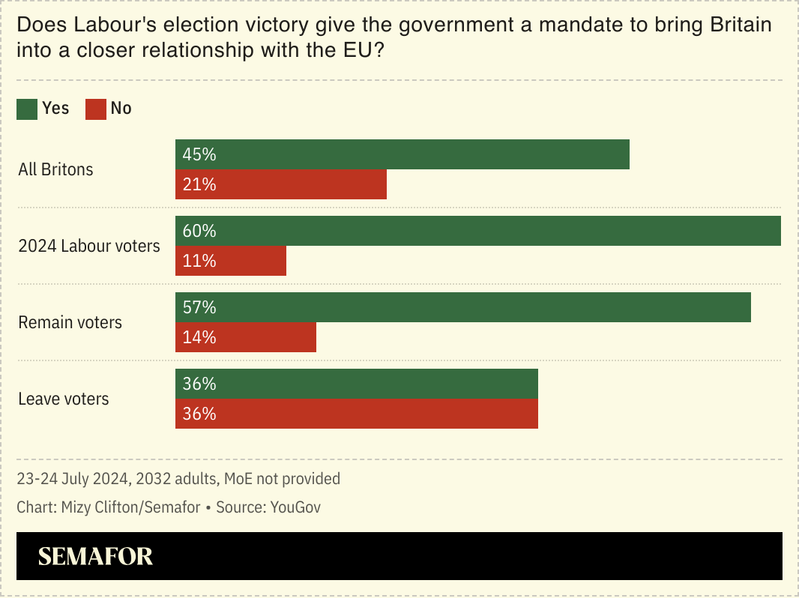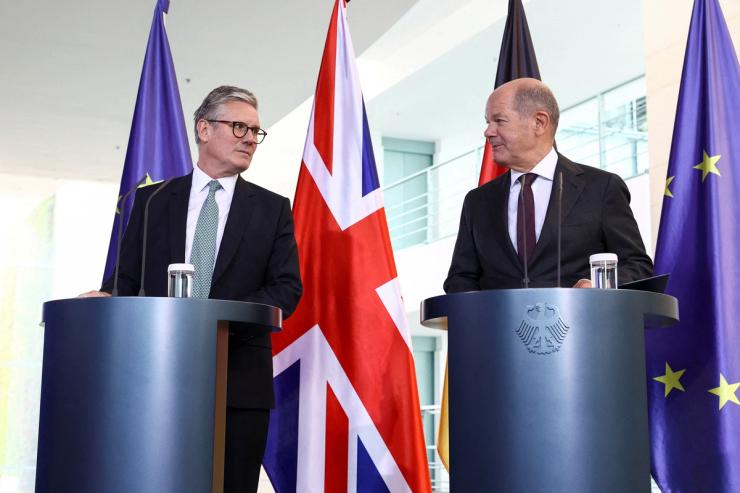The News
British Prime Minister Keir Starmer met with German Chancellor Olaf Scholz in Berlin on Wednesday to discuss a new cooperation treaty that would see the UK and Germany forge closer ties on clean energy, technology, defense, and irregular migration, in what Downing Street described as a “once in a generation opportunity” to “turn a corner on Brexit.”
Details of the agreement have not been disclosed, but it will likely be finalized in the autumn, according to a Downing Street statement.
Also on Starmer’s European agenda is the Paralympics Opening Ceremony in Paris, where he will meet with French President Emmanuel Macron for the fourth time since taking office in July.
SIGNALS
UK wants to lock down deal ahead of potential political change in Germany
While the floated agreement isn’t quite once in a lifetime, and the UK is still a long way from “dramatic” changes like rejoining the single market or the EU itself, Starmer is under pressure to strike a deal with Germany as soon as possible given Scholz risks being replaced by a leader less “ideologically aligned” to British interests in September elections, Joël Reland, a European expert at UK in a Changing Europe told Semafor. Scholz is languishing in the polls with historically low ratings as the right and far-right gain ground, so Starmer won’t be taking any lessons from him on how to keep a center-left government in power, Politico noted.
Starmer only has mandate for a ‘closer relationship’ with EU
A majority of the British public supports reentering the bloc, but also say that Starmer’s government has no mandate to do so, according to recent YouGov polling. However, 45% think there is a mandate for a “closer relationship,” suggesting Starmer may not be punching above his perceived station in pushing for new deals with European allies. The proposed UK-Germany agreement is ultimately part of a “slow, gradual rapprochement” that former Prime Minister Rishi Sunak laid the groundwork for via the Windsor Framework, which stopped the UK-EU relationship from “rotting,” Reland added. Brexit, and the EU more broadly, have “always been structural,” and the reality of the UK now being a “third country” can’t be “wished away by political warmth,” the Financial Times’ public policy editor argued.

Bilateral ties could be boosted as potential new Trump presidency looms
Starmer hopes to build on a separate UK-Germany defense pact already being negotiated, which the countries see as increasingly pressing ahead of a potential “scaling back” of US military support for Ukraine if Donald Trump wins the upcoming presidential election, Reuters noted. The stakes for European security are significantly higher this time around, an expert argued for the Centre for European Reform: Trump’s isolationist instincts would likely be more disruptive (as he would be better able to handle the levers of government, particularly if his alleged plan to remove unsupportive officials comes to fruition), and his choices take on a new significance amid Russia’s war in Ukraine.



